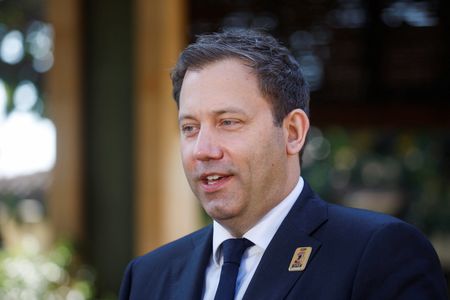By Maria Martinez
DURBAN, South Africa (Reuters) -German Finance Minister Lars Klingbeil made clear in a meeting with his counterparts from the Group of Seven major economies on Friday that the global trade conflict must be ended quickly, he told reporters.
“But I also want to say very clearly: There will be no deal at any price, there should be no victory at any price,” Klingbeil said in Durban, South Africa, on the sidelines of the G20 finance chiefs meetings, where G7 ministers also met separately.
Klingbeil called for a fair deal between the U.S. and Europe on tariffs.
The 30% tariff on imports from European Union threatened by U.S. President Donald Trump would, if implemented, be a game-changer for Europe and a heavy blow for Germany with its export-oriented economy.
Bundesbank President Joachim Nagel also warned of the “great global damage” that the uncertainty from tariffs is causing.
“My appeal to the U.S. side is not to play games with the situation, because in the end, the prosperity of us all is at stake here,” Nagel said at the press event with Klingbeil.
The head of Germany’s Bundesbank had warned on Thursday in an interview with Reuters that the tariff plans risk wiping out even a modest recovery in Europe’s largest economy in the coming years.
U.S. Treasury Secretary Scott Bessent did not attend the two-day G20 meeting in person, his second absence from a G20 event in South Africa this year, though he did join the G7 meeting online on Friday morning, according to Klingbeil.
“We were once again very much in agreement that we want to overcome existing problems, that in the end there should be a solution,” Klingbeil said, referring to his talks with ministers from the G7 nations.
However, the EU is ready and willing to take determined countermeasures if a negotiated solution with the U.S. was not found, Klingbeil said. “In the end, for me it is about protecting jobs and companies in Europe.”
Brussels is discussing countermeasures if a deal is not reached by August 1, including the so-called anti-coercion instrument, which allows the bloc to retaliate against countries that put pressure on EU members to change economic policies.
Asked about this instrument in an interview with Reuters on Thursday, Klingbeil said talks are now focusing on finding a joint solution with Washington, but if it doesn’t work out, the EU will act “united and decisively.”
(Reporting by Maria Martinez, Editing by Miranda Murray and Toby Chopra)











